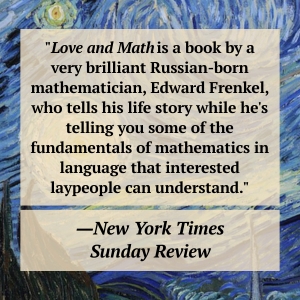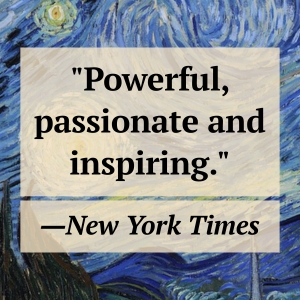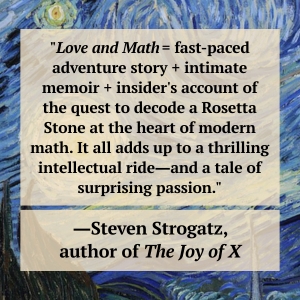Customer Services
Copyright © 2025 Desertcart Holdings Limited





Review Powerful, passionate and inspiring. --The New York TimesFrenkel s winsome new memoir... is three things: a Platonic love letter to mathematics; an attempt to give the layman some idea of its most magnificent drama-in-progress; and an autobiographical account, by turns inspiring and droll, of how the author himself came to be a leading player in that drama. --New York Review of BooksFrenkel writes that math directs the flow of the universe. It s as elegant as music and as much a part of our intellectual heritage as literature. He strives to awaken our wonder by taking us on [a] tour of his research, in which he reveals a hidden world few of us encountered in school... Frenkel aims to make it understandable, even beautiful. --New York Times Book ReviewFrenkel's gusto will draw readers into his own quest, pursuing the deepest realities of mathematics as if it were a giant jigsaw puzzle, in which no one knows what the final image is going to look like. --Publisher's WeeklyReasoning that some of us are unwilling to engage with maths because we cannot see it, Professor Frenkel relates it tirelessly to things we can. A colourful paean to numbers. --The GuardianIf you re not a mathematician this book might make you want to become one. And if you are a mathematician you will feel better about your profession. --Nassim Nicholas Taleb, author of The Black Swan and AntifragileThe words love and math aren t usually uttered in the same breath. But mathematician Edward Frenkel is on a mission to change that...[in his] book, Love and Math [in which] the tenured professor at the University of California at Berkeley argues that the boring way that math is traditionally taught in schools has led to a widespread ignorance that may have even been responsible for the recession... [the] book tells his personal story and goes on to describe his research in the Langlands program, as well as recent mathematical discoveries that aren t regularly taught in classrooms. --The Wall Street JournalI don't know if I've ever used the words love and math together, but this book changed that. In the tradition of his heroes Andre Weil and C. N. Yang, Edward Frenkel writes of the objective beauty of numbers. Like musical notes, they exist apart from the mind, daring us to fathom their depths and assemble them in arcane narratives that tell the story of us. Reading this book, one is compelled to drop everything and give math another try; to partake of the ultimate mystery. --Chris Carter, Creator of the X-FilesPart ode, part autobiography, Love and Math is an admirable attempt to lay bare the beauty of numbers for all to see. --Scientific AmericanTwo fascinating narratives are interwoven in Love and Math, one mathematical, the other personal... Frenkel deftly takes the reader ... to the far reaches of our current understanding. He seeks to lay bare the beauty of mathematics for everyone. As he writes, There is nothing in this world that is so deep and exquisite and yet so readily available to all.' --Marcus du Sautoy, NatureTwo fascinating narratives are interwoven in Love and Math, one mathematical, the other personal... Frenkel deftly takes the reader ... to the far reaches of our current understanding. He seeks to lay bare the beauty of mathematics for everyone. As he writes, There is nothing in this world that is so deep and exquisite and yet so readily available to all.' --Marcus du Sautoy, Nature About the Author Edward Frenkel is a professor of mathematics at the University of California, Berkeley, which he joined in 1997 after spending a few years on the faculty at Harvard University. His recent work has focused on the Langlands Program and dualities in Quantum Field Theory. Frenkel has authored two monographs and over eighty articles in mathematical journals, and he has lectured on his work around the world. The winner of the Hermann Weyl Prize in mathematical physics, he lives in Berkeley, California.



A**R
The Langlands Programme with plot holes and Woman as Muse and Canvas
I was partly hoping to find out what happened next after Simon Singh's wonderful "Fermat's Last Theorem". This book does give you an update on the Langlands Programme, which is interesting and probably very inspiring to the mathematically-inclined teenager. The end notes and other references give you plenty of lines for further reading. The author is nowhere close to Singh as a writer, so you need a decent level of mathematical fluency to really follow that part, but it's still interesting even if you don't really get it. The author loves this stuff and is willing to go to a lot of effort explaining what sheaves are and why it matters; there are also video lectures. The general reader will be better off with anything by Singh, or indeed with the author's own video collaborations with Numberphile, which are brilliantly edited and consequently very enjoyable. As for the autobiographical parts and the click-bait title, the author is not being straight with us. He gets us invested in his ingenuous youth, assuming we are interested, then un-assumes it when it doesn't suit him to say what, if anything, he has learned about being an adult. The Walkman-buying Soviet outcast skips straight to spoiled oblivious middle-aged US academic without any process of transition: refer to the end-note to chapter 16 before you decide whether to buy. This eye-stretching insult to the reader is followed, but not compensated for, by an entertaining account of a magnificently decorative mid-life crisis vanity project in which Woman is Muse and Canvas. It all reads a bit like all the scenes required to make sense of the plot have been censored. If you are a teenager starting out in mathematics and you hope to hear it will be a safe or welcoming world for you - this book will certainly not reassure you. The author thinks it will, but the effect is quite the opposite. He isn't a good enough writer either to convince us of what he wants us to know, or to conceal what he doesn't. The film script bits are jarring, and the blurb endorsement by renowned international redactedwomble N.N. Taleb is kind of perfect. A very unique book. Not all that good, but I've got to hand it to him for trying a lot of things that sound like bad ideas.
I**N
I read Love and Maths alongside Hacking’s “Why is there a Philosophy ...
Frenkel’s book deserves a much wider audience this side of the Atlantic than it currently has.I read Love and Maths alongside Hacking’s “Why is there a Philosophy of Maths at all”, and at least in the first few days, I persevered with the dual task until I eventually focused on Frenkel almost exclusively. I’ve now read the book twice and must admit to having been moved from being merely entertained to being seriously impressed.The title and the first few largely biographical chapters are, in truth, slightly misleading. Once Frenkel gets going, however, he impresses as a serious writer with no quarter given for the less than serious reader. But the “cost”, as can happen so often, is not clarity of accessibility. This last point is interesting. The way that Frenkel ensures no compromise is by providing, in the main body of the book, a fairly low lying terrain. Think of this as a strenuous but ultimately achievable trek up Kilamanjaro. Yes, you have to be able to breath the thin air, but there are no serious 5:5 stretches. You don’t need your climbing rope and crampons or ice pick. However, laced, literally page by page, are footnotes that are more like the diversion to K2. And what an amazing diversion. You can (if you want) be seriously addressed with credible mathematical discourses, and yet stay the course if you feel threatened. Its a smart way of delivering a superb read.Leaving aside this very clever mechanism, the heart of the book brings together a beautifully crafted exposition of the importance of the Langlands programme with a topical weft and weave of contemporary maths.A few months after I read the book a second time I had the chance to meet Frenkel very briefly. He is a disarming and charming man with a steely eyed determination to convey his feelings. The book is the same. Don’t be fooled by the title, and don’t give up in the foothills. The peaks are what count. You will be infected by the love of the subject that so many of us wish we could share with loads more people. I just hope the book gets more of an audience in Britain.Frenkel also wrote the obit for Grothendieck in the NY Times. Well worth the read for those who dont know a mathematician who may well deserve the title of the 20th century's greatest (and yes, I include Godel, Hilbert and Weyl et al in that comparison).
K**Z
Who is this for?
This was disappointing. It's a combination of an autobiography, which is quite interesting, especially his early mistreatment during Communist rule, and an awful attempt at presenting the mathematics he specialises in. Unless you already understand the field in which the author specialises, you will not gain anything from this, and presumably if you do understand it, there will be no need to read this book. There's no structure, no order, no flow. Sometimes concepts are referenced before being explained or even introduced. Long passages are impenetrable to anyone who isn't an expert. I really don't know who this is for. I had hoped it would convey some of the joy of mastering a complex subject such as mathematics and revealing its inner beauty, but while this may be its intention, it doesn't succeed.
Trustpilot
1 week ago
3 weeks ago